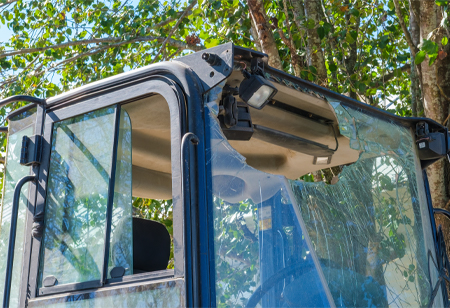
Running a business requires a significant investment in various assets, and equipment is often at the core of daily operations. From computers and machinery to specialized tools and instruments, this equipment keeps your business running smoothly.
However, unexpected events can damage or destroy this vital equipment, leading to significant financial strain. Equipment insurance protects your business against unforeseen events, ensuring operational continuity and financial stability.
The Risks to Your Equipment
Even the most secure and well-maintained equipment faces various threats. Here's a breakdown of common dangers:
A. Threats to Equipment
1) Theft: Whether it's a construction site trailer filled with tools or a high-end server room, equipment theft can be devastating. Imagine a landscaping company losing its entire stock of mowers, trimmers, and edgers—not only is there the replacement cost, but the business is completely halted until new equipment is acquired.
2) Vandalism: Malicious damage can range from a broken display on a customer-facing computer to a deliberate act like disabling critical manufacturing equipment. A restaurant could face significant downtime and lost revenue if its point-of-sale systems were vandalized.
3) Power Surges: Unexpected electrical spikes can fry delicate circuit boards in computers, printers, and other electronic equipment. A photography studio experiencing a power surge might see its editing workstations rendered inoperable, delaying project deliveries.
4) Fire and Natural Disasters: Floods, earthquakes, and fires can cause catastrophic equipment damage. A bakery's ovens and refrigerators could be destroyed in a fire, forcing a complete halt to operations and potentially ruining perishable inventory.
5) Accidents and Malfunctions: Even with proper maintenance, equipment can malfunction or be accidentally damaged by employees. A dropped laptop or a spilled cup of coffee on a keyboard can lead to costly repairs or replacements.
B. Financial Impact
These threats translate into a significant financial burden for businesses.
1) Replacement or Repair Costs: Replacing stolen or damaged equipment can be expensive, especially for specialized or high-tech machinery. A dental practice might face a hefty bill to replace a malfunctioning digital X-ray machine.
2) Business Interruption: Equipment loss or damage can force you to shut down operations or significantly reduce your capacity. This lost productivity translates into lost income, potentially impacting your ability to meet payroll or other financial obligations.
By understanding these risks, businesses can make informed decisions about protecting their assets with the proper equipment insurance coverage.
How Equipment Insurance Protects Your Business
Equipment insurance acts as a financial safety net, safeguarding your business from the burden of replacing or repairing damaged or lost equipment. Here's a closer look at the coverage options and the benefits they provide:
A. Coverage Options
Replacement Value vs. Actual Cash Value:
Replacement Value: This coverage pays the cost of replacing your equipment with a brand-new equivalent, ensuring you have the latest technology and functionality to resume operations seamlessly. Let's say a contractor's brand-new excavator is stolen. Replacement value coverage would ensure they can purchase a new excavator, minimizing downtime and keeping projects on schedule.
Actual Cash Value: This coverage considers depreciation when calculating the payout. You'll receive the current market value of your equipment, minus depreciation based on its age and condition. While this option is typically cheaper, it might not be enough to cover the full cost of replacing the equipment, potentially leaving you with a financial gap.
Specific Perils vs. All-Risk Coverage:
Specific Perils: This policy covers only events explicitly listed in the policy, such as fire, theft, or vandalism. It's generally a more affordable option, but it excludes coverage for any unforeseen events not listed. For instance, a bakery with specific perils coverage for fire damage wouldn't be covered if a power surge fried their ovens.
All-Risk Coverage: This broader policy offers protection against a wider range of perils, including those not explicitly listed. It provides more comprehensive peace of mind, but typically comes with a higher premium.
 B. Benefits of Equipment Insurance:
B. Benefits of Equipment Insurance:
1) Financial Protection for Repairs or Replacements: Equipment insurance helps offset the financial burden of repairing or replacing damaged or lost equipment. This ensures you have the resources to get back up and running quickly, minimizing financial disruptions.
2) Minimized Downtime and Business Interruption: By expediting equipment repairs or replacements, equipment insurance helps minimize downtime caused by equipment issues. This allows businesses to maintain their productivity and avoid lost revenue due to operational slowdowns.
3) Peace of Mind for Business Owners: Protecting your valuable equipment lets you run your business without worrying about potential financial losses from unexpected events. Equipment insurance provides valuable peace of mind and allows you to operate with greater confidence.
Choosing the Right Equipment Insurance Policy
Selecting the right equipment insurance policy involves carefully considering your specific needs and budget. Here are key factors to think about:
1) Value of Your Equipment: The cost of your equipment directly impacts the premium you'll pay. High-value equipment like excavators or medical imaging machines will require more comprehensive coverage compared to basic tools.
2) Type of Equipment and Risks: Different equipment faces unique risks. Construction equipment might be more susceptible to theft and vandalism, while computer servers are vulnerable to power surges. Choose a policy that addresses the specific threats your equipment faces.
3) Budget: Equipment insurance premiums can vary depending on coverage options and your deductible. Consider your budget and find a balance between affordability and adequate protection.
For you to get the best coverage:
1) Shop Around: Compare quotes from multiple insurers to find the best combination of coverage and price.
2) Work with an Agent: A qualified insurance agent can help assess your needs and recommend suitable policy options.
3) Review Regularly: As your business and equipment needs evolve, review your policy coverage regularly to ensure it remains adequate.
Remember, equipment insurance is an investment in the long-term stability and financial security of your enterprise. Don't wait for an unexpected event to disrupt your operations—take proactive steps today to protect your valuable equipment.
We use cookies to ensure you get the best experience on our website. Read more...